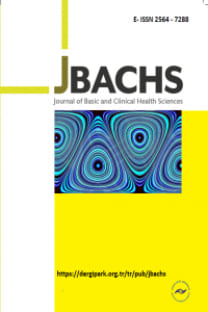Relationship of the standing, stooping and crouching performances with the lower body and lower extremity flexibility and strength
physical fitness pliability, task performance, young adult,
___
- Nicholls A, Gibson L, McKenna K, Gray M, Wielandt T. Assessment of standing in Functional Capacity Evaluations: An exploration of methods used by a sample of occupational therapists. Work 2011;38(2):145-53.doi: 10.3233/WOR-2011-1116.
- United States Department of Labor, Employment and Training Administration. The revised handbook for analyzing jobs. 1991,Washington, DC: U.S. GovernmentPrinting Office.
- Xiao H, McCurdy SA, Stoecklin‐Marois MT, Li CS, Schenker MB. Agricultural work and chronic musculoskeletal pain among Latino farm workers: the MICASA study. American journal of industrial medicine2013;56(2):216-25.doi: org/10.1002/ajim.22118.
- Haslegrave CM, Tracy MF, Corlett EN. Strength capability while kneeling. Ergonomics 1997;40(12):1363-79.doi: 10.1080/001401397187414.
- Gallagher S. Physical limitations and musculoskeletal complaints associated with work in unusual or restricted postures: a literature review. Journal of Safety Research 2005;36(1):51-61.doi: 10.1016/j.jsr.2004.12.001.
- Kearney GD, Allen DL, Balanay JAG, Barry P. A descriptive study of body pain and work-related musculoskeletal disorders among Latino farmworkers working on sweet potato farms in eastern North Carolina. Journal of agromedicine 2016;21(3):234-43.doi: 10.1080/1059924X.2016.1178613.
- Suhardi B, Astuti RD, Widodo AT. Design of polishing tools for improving work posture in furniture industry. Joint International Conference on Electric Vehicular Technology and Industrial, Mechanical, Electrical and Chemical Engineering (ICEVT & IMECE), 2015.doi: 10.1109/ICEVTIMECE.2015.7496678.
- Hernandez ME, Goldberg A, Alexander NB. Decreased muscle strength relates to self-reported stooping, crouching, or kneeling difficulty in older adults. Physical therapy2010;90(1):67-74.doi: 10.2522/ptj.20090035.
- Glinka MN, Weaver TB, Laing AC. Age-related differences in movement strategies and postural control during stooping and crouching tasks. Human Movement Science 2015;44:246-257. doi: 10.1016/j.humov.2015.09.004.
- Masani K, Sayenko DG, Vette AH. What triggers the continuous muscle activity during upright standing? Gait & posture 2013;37(1):72-7.doi: 10.1016/j.gaitpost.2012.06.006.
- Weaver TB, Glinka MN, Laing AC. Stooping, crouching, and standing–Characterizing balance control strategies across postures. Journal of biomechanics2017;53:90-6.doi: org/10.1016/j.jbiomech.2017.01.003
- McHugh MP, Kremenic IJ, Fox MB, Gleim GW. The role of mechanical and neural restraints to joint range of motion during passive stretch. Medicine and science in sports and exercise 1998;30(6):928-32.doi: 10.1097/00005768-199806000-00023.
- Caspersen CJ, Powell KE, Christenson GM. Physical activity, exercise, and physical fitness: definitions and distinctions for health-related research. Public health reports 1985;100(2):126.
- Piercy KL, Troiano RP, Ballard RM et al. The physical activity guidelines for Americans. Jama 2018;320(19):2020-8.doi:10.1001/jama.2018.14854.
- Christopherson B, Hayes P. Valpar component work samples uses in allied health. Valpar International Corporation, Tucson 2006.
- Dailey DL, Keffala VJ, Sluka KA. Do cognitive and physical fatigue tasks enhance pain, cognitive fatigue, and physical fatigue in people with fibromyalgia? Arthritis care & research 2015;67(2):288-96.doi: 10.1002/acr.22417.
- Schult ML, Söderback I, Jacobs K. Swedish use and validation of Valpar work samples for patients with musculoskeletal neck and shoulder pain. Work 1995;5(3):223-33.doi: 10.3233/WOR-1995-5310.
- Hoeger WWK, Hopkins DR, Button S, Palmer TA. Comparing the sit and reach with the modified sit and reach in measuring flexibility in adolescents. Pediatric Exercise Science1990;2(2):156-62.
- Hu H, Li Z, Yan J et al. Anthropometric measurement of the Chinese elderly living in the Beijing area. International Journal of Industrial Ergonomics 2007;37(4):303-11.doi: 10.1016/j.ergon.2006.11.006.
- Miñarro PAL, de Baranda Andújar PS, García PLR. A comparison of the sit-and-reach test and the back-saver sit-and-reach test in university students. Journal of sports science & medicine2009;8(1):116.
- Barnekow‐Bergkvist M, Hedberg G, Janlert U, Jansson E. Development of muscular endurance and strength from adolescence to adulthood and level of physical capacity in men and women at the age of 34 years. Scandinavian journal of medicine & science in sports 1996;6(3):145-55.doi: 10.1111/j.1600-0838.1996.tb00082.x.
- Aslan CS, Çınar Z. Aktif veya sedanter kadin ve erkek bireylerin seçilmiş fiziksel ve fizyolojik özelliklerinin karşilaştirilmasi. Turkish Journal of Sports Medicine2012;47(1):029-36.
- Zorba E, Ziyagil MA. Sigara içen/içmeyen ve spor yapan/yapmayan üniversite öğrencilerinin bazi fizyolojik ve antropometrik özelliklerinin karşilaştirilmasi. Gazi Beden Eğitimi ve Spor Bilimleri Dergisi1998;3(3):11-20.
- Yayın Aralığı: 3
- Başlangıç: 2016
- Yayıncı: DOKUZ EYLÜL ÜNİVERSİTESİ
Cihan Caner AKSOY, İsmail SARACOGLU, Lütfiye AKKURT
Mehmet DURAY, Nilüfer ÇETİŞLİ KORKMAZ, Hatice AKÇİN, Dudu ŞİMŞEK
Ayşegül SAVCI, Özlem BİLİK, Hakan AKKAN, Nilay YÜREKDELER ŞAHİN, Hale TURHAN DAMAR
Ebru GÖKDEMİR, Seyma ONCU, Ayse GELAL, Reyhan UÇKU, Aylin ARİCİ
Eda KILINÇ, Fadime Hatice İNCİ, Asiye KARTAL
